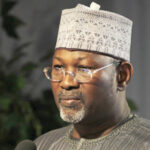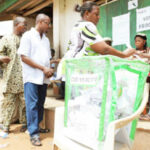Nigeria’s 21 years of democracy was tested with the conduct of last year’s 2019 general elections. The elections presented an opportunity for Nigeria to consolidate on the gains of the 2015 elections and deepen her democratic transition, but the polls substantially failed to do so.
The Independent National Electoral Commission (INEC) introduced reforms to deepen electoral integrity and citizen participation before the elections, yet the elections were fraught with the same shortcomings that marred previous national elections in Nigeria.
As in past elections, INEC’s logistical challenges coupled with misconduct on the part of political parties and candidates undermined the elections‘ integrity. Not to mention the assault on voting rights by desperate politicians who recruited thugs and security agencies for voter suppression. The judiciary was no bystander. In most cases, it determined the final vote by substituting justice for legal technicalities with its logic of constitutional finality.
- Elections: Albino foundation urges INEC to make disability materials sensitive
- INEC may deploy Electronic Voting technology in 2021 Anambra elections
The Supreme Court suffered a reputational setback when it declared a candidate who came fourth in an election the winner, despite computational inaccuracies and disputed results from polling units where elections did not hold.
The landscape for electoral reform looks promising. Over ten proposed electoral amendment bills are under consideration at the National Assembly. Although these bills are at different stages of the legislative process, they contain proposals that can potentially fix Nigeria’s pressing electoral challenges, especially the predatory behavior of the political class.
The bills include proposed amendments that promote the independence and impartiality of INEC by strengthening the legality of INEC regulations, guidelines, and manuals and prohibiting the employment or appointment of members of political parties into INEC.
Also contained in the bills are proposals for electronic voting and transmission of election results. Comprehensive amendments were proposed to Section 87 of the Electoral Act on the nomination of candidates. They introduce new procedures for direct and indirect primaries and provide thresholds for party nomination fees. It restricts parties to the qualification criteria fixed by the 1999 Constitution as amended for elective offices, thereby stripping parties of the power to introduce additional measures often used to disqualify unfavoured candidates.
Recently, INEC released its agenda on electoral reform. The Commission is proposing amendments to strengthen the electoral Commission’s financial autonomy, confer power on INEC to suspend elections under certain circumstances, and the power to disqualify candidates. Other proposals include new timelines for campaigns and candidate nomination, review of election results declared under duress, diaspora voting, and improved oversight on political parties, amongst others. Civil society groups have also proposed amendments to the electoral legal framework. Signals from the National Assembly thus far shows that the electoral amendment process may be concluded by 2021.
A cost-benefit analysis of public expenditure on elections is an essential component of the electoral reform agenda. This analysis is highly recommended given the country’s economic recession due to bad economic choices, disruptions in public finance, and negative externalities.
Political scientists will argue that the high costs of elections are an investment in democracy; therefore, countries should earmark adequate resources for election conduct. This seems like a plausible argument, especially for nations still evolving with a democratic culture. But what happens to equity and efficiency? What is the benefit of expending scarce resources on elections that fail to maximize utility or promote happiness for the greatest number in society, or elections that yield just outcomes? Should Nigeria spentN139Billion (N1,893 or $9 cost per voter) for the 2011 elections; N116.3 Billion (N1,691 or $8.5 cost per voter) for the 2015 elections; and N189.2 Billion (N2,249 or $6.24 cost per voter) for the 2019 elections. All three elections recorded a poor turnout of voters.
In Nigeria, the law compels the electoral Commission to use the voter register as a basis for election planning as against the figures for collected Permanent Voters Card (PVC). In the 2019 elections, INEC printed over 427.5 million ballot papers (of currency quality) for 80 million registered voters in the six scheduled elections. Less than 30 million ballots were used in the elections because only35 percent of registered voters showed up to vote. Billions of Naira went to waste due to a large number of unused ballots papers. These scarce resources plowed to produce the unused ballot papers would have been allocated to health, education, or jobs given Nigeria’s place as the world’s poverty capital. Efficient allocation of scarce resources should be a priority agenda for reformers of our electoral process. This should encompass a clear strategy for reversing the deeply entrenched culture of waste in public finance management.
No doubt, the current proposed amendments can foster popular sovereignty. Still, it is uncertain whether the ruling political class will pass these laws, given the potential of reforms to limit future chances of electoral victory. The apparent assumption is that most politicians will be reluctant to legislate themselves out of office. Therefore, they employ diverse tactics to dictate the pace and influence the outcome of reform efforts, leaving society to manage the tensions between individual and collective interests.
A just society is one that places the maximization of happiness as a key basis for decision-making. Moral decision making should be premised on maximizing the total happiness of members of society and advancing the common good, not just the interests of a few.
As legislators consider decisions on electoral reforms within the ramifications of options available to them, they should be guided to choose options that serve the common good.
In other words, in the spirit of democracy, they should pass electoral amendments that promote the common good of the Nigerian majority, in essence, the people and not the political class. After all, political authority is expected to serve the interests of the people, not individual interests.
As Xunsi puts it, ‘Heaven did not create the people for the sake of the Lord, heaven established the Lord for the sake of the people.’ If an electoral amendment reflects the aggregate of the greater good, it indicates its responsiveness to the will and aspirations of the people. Suffices to say, the greater the number of citizens who participate in designing a new electoral legal framework, the greater our chances of producing just outcomes and advancing the common good.
Citizens bear the burden to hold the ruling political elite to higher standards. Electoral policies should place a premium on moral principles, ethics, and maximization of happiness. The 9th National Assembly will be judged by the extent to which the proposed electoral amendments promote happiness for the greater number and not just the political elites. Any piece of electoral legislation that will not guarantee the people’s participation, protect the sanctity of the vote or advance electoral justice may not serve the common good. Suffice to say that there’s nothing special about the ongoing electoral reform process if it does not yield the greater good for the greater number, instead of yielding the greater good for the one percent who control political power.
Samson Itodo is a Master of Public Policy candidate at the Blavatnik School of Government, University of Oxford. He is an elections and constitution building enthusiast. He serves as Executive Director of Yiaga Africa and the Convener of the Not Too Young To Run movement. Send comments and feedback to [email protected]. He tweets @DSamsonItodo

 Join Daily Trust WhatsApp Community For Quick Access To News and Happenings Around You.
Join Daily Trust WhatsApp Community For Quick Access To News and Happenings Around You.


